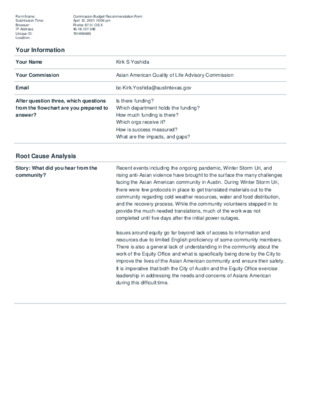Agenda Item 2a2_Health and Community Engagement Workgroup — original pdf
Backup

Form Name: Submission Time: Browser: IP Address: Unique ID: Location: Your Information Commission Budget Recommendation Form April 12, 2021 10:06 pm Firefox 87.0 / OS X 45.18.127.248 791499489 Your Name Kirk S Yoshida Your Commission Asian American Quality of Life Advisory Commission Email bc-Kirk.Yoshida@austintexas.gov After question three, which questions from the flowchart are you prepared to answer? Is there funding? Which department holds the funding? How much funding is there? Which orgs receive it? How is success measured? What are the impacts, and gaps? Root Cause Analysis Story: What did you hear from the community? Recent events including the ongoing pandemic, Winter Storm Uri, and rising anti-Asian violence have brought to the surface the many challenges facing the Asian American community in Austin. During Winter Storm Uri, there were few protocols in place to get translated materials out to the community regarding cold weather resources, water and food distribution, and the recovery process. While the community volunteers stepped in to provide the much-needed translations, much of the work was not completed until five days after the initial power outages. Issues around equity go far beyond lack of access to information and resources due to limited English proficiency of some community members. There is also a general lack of understanding in the community about the work of the Equity Office and what is specifically being done by the City to improve the lives of the Asian American community and ensure their safety. It is imperative that both the City of Austin and the Equity Office exercise leadership in addressing the needs and concerns of Asians American during this difficult time. Problem: What is the problem you identify? How does the problem show up in your community? Who is most impacted by the problem? In a few short years, the Equity Office team, in coordination with the Joint Inclusion Committee (JIC), has made great strides in by providing equity training to City staff and others, implementing new equity based grant programs, providing leadership during the Reimagining Public Safety process, and many more. However, there is a general lack of understanding in the Equity Office regarding Austin's Asian American community, which is very diverse in terms of language, customs, and cultures. The Asian American Quality of Life (AAQoL) Advisory Commission is often called upon by the Equity Office and other City departments to provide the community perspective and connections to community members. While the Commission is willing and able to assist the Equity Office and City departments, the Commission has limited capacity, and the efforts of the Commission not anywhere near as effective as they could be with a staff member focused on issues specific to the Asian American community. The lack of awareness and understanding of the Asian American community and its needs means that much of the outreach to our community must be handled by the Commission. Recent examples include recruiting the majority of participants for the LGBTQIA+ Quality of Life Asian American focus group and creating our own marketing/outreach materials for the JIC budget engagement forums. In addition, the work of the Commission has been negatively impacted by the move of staff liaison out of the Equity Office. Without a specific staff focus on Asian American issues, our community is at a disadvantage in proposing and advancing solutions. This lack of coordinated effort and clear path to take action on Commission recommendations means that the needs of our community are not being effectively addressed. It also perpetuates an attitude among community members that the City does not prioritize the needs of the Asian American community at the same level as other groups. Is there funding to address the problem? Do multiple departments administer these funds? How much funding is identified to address this problem? Which organization(s) or program receives the funding? Yes No 100000 None Which department holds the funding? Equity Office How is success measured in the contract/department? How does this align with SD2023? Economic Opportunity and Affordability Safety Cultural and Lifelong Learning Mobility Health and Environment Government that Works for All of Us What are the impacts of the funding? Considering all of the information you have or have not collected above, how do we solve for this problem? Representation of the Asian American perspective within the Equity Office would benefit the entire Asian American community in Austin. Asians American currently comprise 8% of the City's population and are the fastest growing demographic group. The work of the Equity Office, with support from the AAQoL Advisory Commission, intersects all of the City Council's strategic directions. Without this representation and focus on specific issues facing the Asian American community, the AAQoL Advisory Commission is asked to do this work but lacks an effective means to take action of its recommendations. The AAQoL Advisory Commission continues to work with individual City departments and the Human Resources Department to improve the representation of Asians in the City's workforce. City leaders have expressed a commitment to improving equity and reducing disparities both its workforce and the community. Moreover, the Equity Office is tasked with leading this effort for the City, and it is imperative its staff reflect the community, including the Asian community. The Equity Office plays a pivotal role in working with City departments to address Council's primary objectives, but the Asian American perspective is missing. It's important that the Equity Office staff includes someone who can relate to the Asian experience and effectively advance the recommendations of the Commission. The Commission recommends that a Business Process Consultant position be added to the Equity Office to include the Asian perspective in its work.